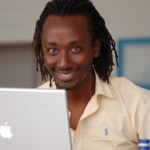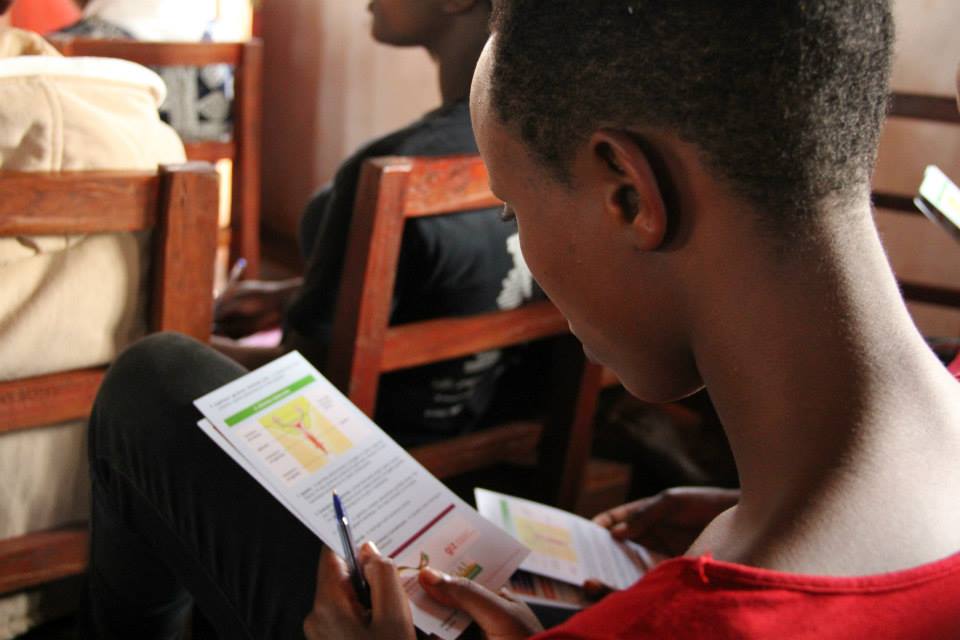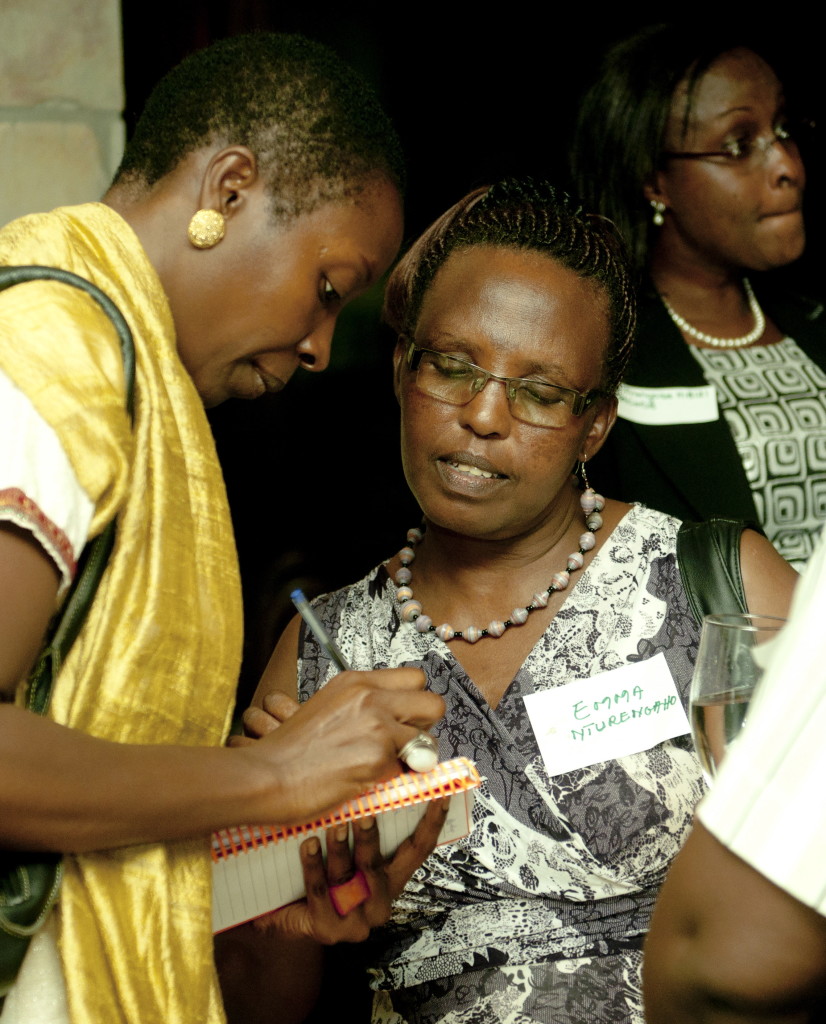A guest post by Dedo N. Baranshamaje, Segal Family Foundation‘s Burundi Country Director.

Twenty-two people sit in a room. No one is comfortable enough to talk louder than a whisper. There are only murmurs of “bonjour” and “je m’appelle…” But I know the awkwardness of being in a room full of strangers will quickly change once the seven months of training begins.
Creating a space for collaboration can be very uncomfortable. Burundi has over 5,000 non-profit organizations (NGOs) struggling to find funding. Cooperation between peer organizations isn’t easy when NGOs are in a jousting match over money.
I’d normally feel a little nervous standing in front of a room full of leaders and entrepreneurs too. But my job is to explain how the Social Impact Incubator (SII) will improve their work. The results were in from our inaugural class two years before, so my confidence is high. Graduates from SII 1.0 have nearly $1 million invested in their organizations by Segal Family Foundation and other funders.
As a consortium, SII shares a philosophy that “top down” funding may be upside down. When 60% of the Burundian population is chronically malnourished, it’s time to try a new approach that may have better and faster results.
Indigenous organizations have a better understanding of the local context and challenges. Their work is rooted in community trust. And their impact is sustainable. When it is your country, your community, your home – no one is thinking about packing up and trying the model elsewhere. But without the necessary resources, growing and scaling up can be difficult for indigenous organizations. That’s where SII can help.
Take for instance Dr. Tharcisse Nshimirimana, Medical Coordinator for Service Yezu Mwiza (SYM). Dr. Nshimirimana runs their mobile health program, empowering hundreds of youth, men and women “champions” to deliver health messages in their own communities. Before participating in SII 1.0, SYM’s health clinic and outreach services were effective, but not scalable. Now SYM has grown their institutional capacity and network allowing them to take on bigger, more complex projects.
Or take Françoise Nibizi, founder of SaCoDé and graduate of SII 1.0, whose youth SMS sexual education program—Burundi’s first of its kind—is successful because it’s run by youth for youth. SaCoDé works to help youth grow up in dignity in seven provinces and will soon be expanding to four more of Burundi’s 17 provinces.

Segal Family Foundation (SFF) funds and provides capacity building support to over 180 grassroots NGOs across 20 Sub Saharan African countries. When we launched SII in 2013, we saw it as a chance to do something slightly different, something a bit more tailored for Burundi, a country typically off funder’s radar.
We are always searching for creative and strategic partnerships and we are not alone. CARE International Burundi Country Director, Bena Musembi, observed the intensive seven-month training program, mentorship program, individualized coaching, and networking opportunities during SII 1.0.
“The SII is an effective partnering model. Indeed, SII graduates are at the frontline of the emerging progressive local NGOs, willing and capable of positively transforming the civil society landscape in Burundi. SII is a dream come true for CARE Burundi – a viable avenue for fostering civil society growth and positive transformation in Burundi,” said Musembi.
CARE decided to join SII in its second year (SII 2.0), and as we roll out SII 3.0 this month, Action Aid Burundi will join SFF and CARE to run SII 3.0 as a consortium with even more resources and refinement from two years of experience. INGOs, like ActionAid and CARE, can bring more expertise, more mentors, and additional resources to support the success of indigenous organizations.
“We see SII as the cornerstone of future development partnerships in Burundi,” said Beata Musabyemariya, Country Director of AcionAid Burundi. “SII acts as a bountiful nursery, giving all development actors room to grow.”

Cynthia Ndongozi, founder of United for Children Burundi Bwuno Munsi (UCBUM), said that it’s SII’s tailored coaching that helped UCBUM create a network of community thinkers to support their work. It’s one of the enabling factors that transformed UCBUM from an idea to an organization. Ndongozi has seen her peers have similar ideas to improve social development that have never left the idea stage.
The ideas are bountiful in Burundi. With over 200 applications for our 2015 program, it’s been difficult to select only thirty for SII 3.0’s new cohort.
The strategic partnerships that are created at SII only continue to grow as our graduates grow and scale their organizations. Last year, our two cohorts of graduates launched the SII Alumni Network. They gather to support each other, apply for joint proposals, and unite around advocacy issues. Through the Alumni Network, SII graduates are building a relationship with Project Oscar, an EU-funded program supporting joint activities and initiatives of local actors.
SII organizations are prioritizing process over projects, questions over answers, and collaboration over competition. But more importantly, to improve the lives of Burundi’s 10 million people, they are transforming the civil society environment overall.
And that’s why when I welcome SII 3.0’s new class this month, I won’t be nervous at all.
***
For more information on the Social Impact Incubator, contact Alyssa Mesich, Segal Family Foundation Communications Manager: alyssa (at) segalfamilyfoundation (dot) org
***
Related Posts
How would you measure the strength of a partnership?
Do grassroots organizations in poor countries have an image problem?
The stories still hard to find: The local responses to Ebola
Briefcase NGOs: How widespread is this, really?
Building a Fire: Thinking twice about how we look at organizational capacity assessment

Thank you so much Dedo for the presentation.It is very important case for BURUNDI challenges and we think it will be benefit for burundian people.
The burundian NGO will be strong after tre training SII.
The partenership between indigenous and the international NGO is one of the best way for to reach the solution of burundian issues
God bless you
Best regards
Dr Jean Pierre NDAYIRUKIYE/IPROSARUDE
The SII is a great plat platform for CBOs and International NGOs to work together. I welcome the idea of working together.
Lets talk more on consortium hood.
Je salue l’idée car même certain proverbe au Burundi le dit ” UBUGIRIGIRI BUGIRA BABIRI” ce qui signifie “L’union fait la force”.
Espérons qu’un jour les bons élèves seront nombreux.
Exemple pour soutenir l’ idée de Dedo.
5 femmes au Burundi qui se connaissent et qui font le même type de business, vont à Dubbai dans un même avion, même destination, pour même achat à revendre…
perte du temps et d’argent…
Pourquoi?
1. Peur du vol
2. Manque de maîtrise de soie pour honorer la promesse
Témoignage : je suis heureuse aujourd’hui
car mes collègues (les 6 fondatrices de UCBUM) ont compris ce que ils ont appris dans SII et voilà ma vocation et mon idée a été valorisé GRACE A CET UNION SANS ELLES MES REVES N ALLAIENT PAS DEVENIR UNE REALITE.
MERCI DEDO ET FELICITATION , VA DE L AVANT CHANGE LE MONDE.